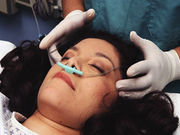Prophylactic use of low-dose continuous or nocturnal oxygen not linked to a better outcome
TUESDAY, Sept. 26, 2017 (HealthDay News) — The prophylactic use of low-dose oxygen does not reduce death or disability at three months among patients with acute stroke, according to a study published in the Sept. 26 issue of the Journal of the American Medical Association.
Christine Roffe, M.D., from the University Hospital of North Midlands NHS Trust in Stoke-on-Trent, U.K., and colleagues conducted a single-blind randomized trial involving 8,003 adults with acute stroke enrolled within 24 hours of hospital admission if they had no indications for or contradictions to oxygen treatment. Participants were randomly allocated to continuous oxygen for 72 hours (2,668 patients), nocturnal oxygen for three nights (2,667 patients), or control (oxygen if clinically indicated, 2,668 patients).
The researchers found that the unadjusted odds ratio for a better outcome was 0.97 (95 percent confidence interval, 0.89 to 1.05; P = 0.47) for oxygen versus control; and for continuous versus nocturnal oxygen, the odds ratio was 1.03 (95 percent confidence interval, 0.93 to 1.13; P = 0.61). No subgroup was found to benefit from oxygen. At least one serious adverse event occurred in 13.0, 11.0, and 12.1 percent of participants in the continuous oxygen group, nocturnal group, and the control group, respectively.
“Among nonhypoxic patients with acute stroke, the prophylactic use of low-dose oxygen supplementation did not reduce death or disability at three months,” the authors write.
Abstract/Full Text (subscription or payment may be required)
Copyright © 2017 HealthDay. All rights reserved.








